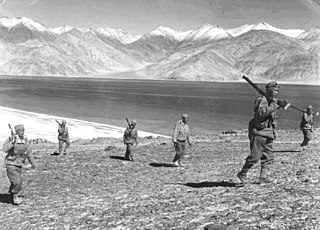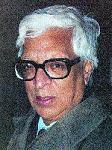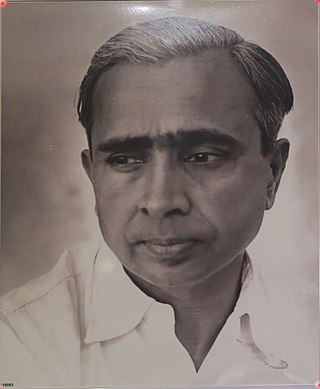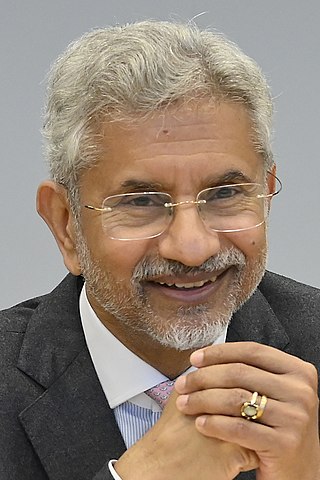
Jawaharlal Nehru was an Indian anti-colonial nationalist, secular humanist, social democrat, and author who was a central figure in India during the middle third of the 20th century. Nehru was a principal leader of the Indian nationalist movement in the 1930s and 1940s. Upon India's independence in 1947, he became the first prime minister of India, serving for 16 years. Nehru promoted parliamentary democracy, secularism, and science and technology during the 1950s, powerfully influencing India's arc as a modern nation. In international affairs, he steered India clear of the two blocs of the Cold War. A well-regarded author, his books written in prison, such as Letters from a Father to His Daughter (1929), Glimpses of World History (1934), An Autobiography (1936), and The Discovery of India (1946), have been read around the world. The honorific Pandit has been commonly applied before his name.

The Sino-Indian War also known as Indo-China War, Indo-China War of 1962 or Sino-Indian War of 1962, took place between China and India from October to November 1962. It was a military escalation of the Sino-Indian border dispute. Fighting occurred along India's border with China, in India's North-East Frontier Agency east of Bhutan, and in Aksai Chin west of Nepal.
The Five Principles of Peaceful Coexistence are the Chinese government's foreign relations principles first mentioned in the 1954 Sino-Indian Agreement. Also known as Panchsheel, these principles were subsequently adopted in a number of resolutions and statements, including the preamble to the Constitution of the People's Republic of China.

The Line of Actual Control (LAC), in the context of the Sino-Indian border dispute, is a notional demarcation line that separates Indian-controlled territory from Chinese-controlled territory. The concept was introduced by Chinese premier Zhou Enlai in a 1959 letter to Jawaharlal Nehru as the "line up to which each side exercises actual control", but rejected by Nehru as being incoherent. Subsequently, the term came to refer to the line formed after the 1962 Sino-Indian War.

The People’s Republic of China and the Republic of India established bilateral relations in 1950. India and China have historically maintained peaceful relations for thousands of years of recorded history, but the harmony of their relationship has varied in modern times, after the Chinese Communist Party's victory in the Chinese Civil War in 1949, and especially post the Annexation of Tibet by the People's Republic of China. The two nations have sought economic cooperation with each other, while frequent border disputes and economic nationalism in both countries are a major point of contention.

Jawaharlal Nehru University (JNU) is a public major research university located in New Delhi, India. It was established in 1969 and named after Jawaharlal Nehru, India's first Prime Minister. The university is known for leading faculties and research emphasis on social sciences and applied sciences.
The following lists events that happened during 1962 in the Republic of India.

Jawaharlal Nehru Stadium is a multi-sports stadium located in New Delhi, India. It is named after the first Prime Minister of India, Pandit Jawaharlal Nehru. Primarily a venue for football and athletics, it is an all-seated 60,254 capacity stadium, designed and constructed to meet the international standards for stadiums set by the International Federation of Association Football (FIFA), the Asian Football Confederation (AFC), and the International Association of Athletics Federations (IAAF). It is the fourth largest stadium in India, 27th largest stadium in Asia and the 103rd largest stadium in the world, in terms of seating capacity.

Sarvepalli Gopal was a well-known Indian historian. He was the son of Sarvepalli Radhakrishnan, the first Vice-President and the second President of India. He was the author of the Radhakrishnan: A Biography and Jawaharlal Nehru: A Biography.

Kesava Shankar Pillai, better known as Shankar, was an Indian cartoonist. He is considered the father of political cartooning in India. He founded Shankar's Weekly, India's Punch in 1948. Shankar's Weekly also produced cartoonists like Abu Abraham, Ranga and Kutty, he closed down the magazine during the Emergency of 25 June 1975. From then on he turned to making children laugh and enjoy life.

The Nehru Cup was an international association football tournament organised by the All India Football Federation (AIFF), named after the first Prime Minister of India, Jawaharlal Nehru. It was launched in 1982, but was not held from 1998 to 2006. After the trophy was won by Iraq in 1997, it was reinstated only in 2007 before officially being held last in 2012 and was replaced in 2017.
Muzaffar Alam is the George V. Bobrinskoy Professor in South Asian Languages and Civilizations at the University of Chicago.
Tan Chung is an authority on Chinese history, Sino-Indian relations and cultural exchange. He has been a doyen of Chinese cultural studies in India for nearly half a century.
B. R. Deepak is an Indian sinologist. He is the first Indian to receive China's highest literary award.
Subimal Dutt, OBE, ICS was an Indian diplomat and ICS officer. He served as India's Commonwealth Secretary and later as Foreign Secretary under Jawaharlal Nehru and was also India's ambassador to the Soviet Union, Federal Republic of Germany and Bangladesh.

Dr. Subrahmanyam Jaishankar is an Indian diplomat and politician serving as the Minister of External Affairs of the Government of India since 30 May 2019, became the second ever diplomat to be appointed as External Affairs minister, after Natwar Singh. He is a member of the Bharatiya Janata Party and a Member of Parliament in the Rajya Sabha since 5 July 2019. He previously served as the Foreign Secretary from January 2015 to January 2018.

Professor Anvita Abbi is an Indian linguist and scholar of minority languages, known for her studies on tribal languages and other minority languages of South Asia. In 2013, she was honoured with the Padma Shri, the fourth highest civilian award by the Government of India for her contributions to the field of linguistics.
The History of Indian foreign policy refers to the foreign relations of modern India post-independence, that is the Dominion of India (from 1947 to 1950) and the Republic of India (from 1950 onwards).

Ranjit Sitaram Pandit was an Indian barrister, politician, author and scholar from Rajkot in the Kathiawar region of British India. He is known for his role in the Indian non-cooperation movement, and for translating the Sanskrit texts Mudrarakshasa, Ṛtusaṃhāra and Kalhana's Rajatarangini into English.
Longju or Longzu is a disputed area in the eastern sector of the China–India border, controlled by China but claimed by India. The village of Longju is located in the Tsari Chu valley 2.5 kilometres (1.6 mi) south of the town of Migyitun, considered the historical border of Tibet. The area of Longju southwards is populated by the Tagin tribe of Arunachal Pradesh.











